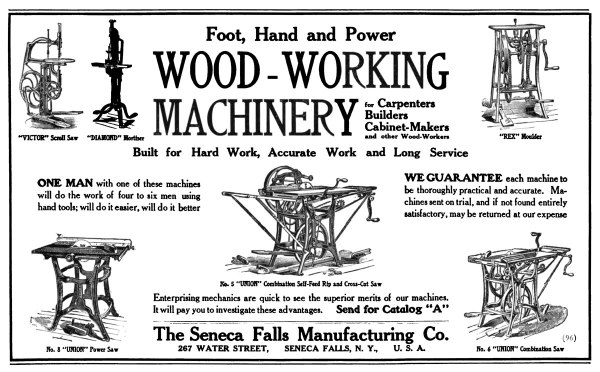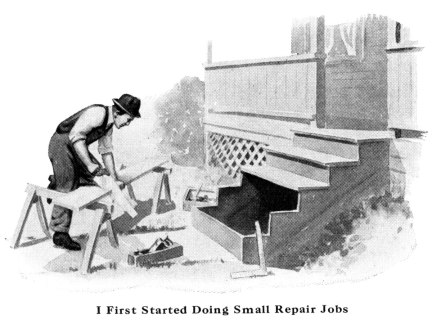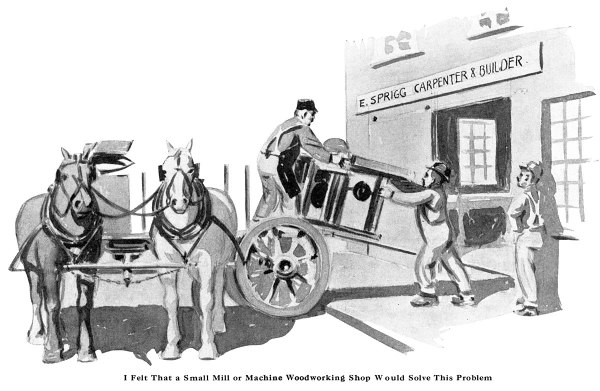
Having served three years at my trade as a carpenter, five years as a floor mill millwright and machine wood-worker, I made up my mind that I could do business on my own hook. I first started by doing small repair jobs, reshingling roofs, building porches, and small house additions. On this kind of work (which I did at the regular price charged by the local contractor for my own wage, and furnished a man at a profit of 25¢ per day and a small per cent on some materials furnished) I worked along for a year, and then took a contract to build an ordinary eight-room house, furnishing all the materials and labor.
I had always kept track of the cost of the labor and materials for making frames and placing materials, noting the time that it took me to do all these things. I based my estimate for the house contract on this knowledge; and on this contract I made wages for myself and a small profit. By keeping careful account of the cost of labor and material, and comparing the cost of each item with my estimate of same, I was able to tell where some were high and some low.

Using this knowledge and past experience, I then began to go out after business, and the next five years were very busy ones, working with my men days, while figuring plans and buying materials and keeping books night kept me out of mischief often as late as till two o’clock in the morning. Many of the jobs done during these years were from plans and specifications made by myself, from knowledge gained at a Y.M.C.A. night school; and all the details worked out as the work progressed.
A trade journal coming regularly to my desk brought me much useful information, and helped me to establish a reputation as a builder who kept up to date. And let me add right here that the young man who does not take a trade journal to keep himself in touch with his business will always be a back number.
My satisfied customers were my best advertisement; and local architects began to send me their plans for estimates. I built from some of them, but was always careful not to load up too heavy, believing that it was better to have a small business well managed than a large one-half done. Then, as my capital was limited and I had a horror of debt, I felt that it was better to work within my means. I have seen several firms fail because they tried to do more business than they had capital for.
After following the business as a contractor for several years, I began in a small way to handle building material, nails, hardware, building paper, and small quantities of lumber, the latter being purchased from small saw mills and farmers who have a few thousand feet at a time. I would have this lumber planed at the local shops and store it in a small shop, 16 by 26 feet, two stories high, at the rear of my house.
I purchased at this time a hand power, self-feed rip saw; and with a good miter box and this saw and good tools we made all our frames and light mill work at a fair profit. With increasing business came a demand for more room, and at this period I purchased two lots, two blocks from my house, making a plot of ground 80 by 150, which I fenced and bought a small two-story shop and moved it on these lots; built a small lumber shed; bought a horse and small lumber wagon; and then began to deal in building material, especially lumber, and did a larger contracting business.
One trouble that I always had was to get materials from the local planing mills worked and delivered to our jobs to keep my men working to the best advantage; and I felt that if I had a small mill I could solve this problem.

I studied the matter carefully for several years, and finally made a deal for a planer, saw, small jointer, scroll saw, lathe, emery wheel, sand paper drum, and quantity of pulleys, shafting, belting, etc. These machines were in fair condition, and by adding to my small two-story shop some sheds, in which I placed these machines and then bought a new 10 H.P. gasoline engine, I was equipped to do a vast amount of our mill work in our shop. By using local lumber, which I bought at low prices from farmers, I was able to sort and get good grades of lumber for my frames and trim at small cost. Being near to three factories, I readily secured their odd work and was able to keep going through the winter months.
Four years after installing engines and machines, I had bought more ground, and built a larger mill with machines for making all kinds of wood work; had installed a steam plant, dry kilns, and erected sheds for storing 50,000 feet of lumber; and with bench shop, stock rooms, office, etc., and a good force of men was doing a business of building and building materials, of $40,000.00 per year.
Considering the fact that I had started to learn my trade 22 years before, and that all my earthly possessions consisted of a suit of clothes and $15.00 worth of tools, and now owned my own home, an 8 room house with all modern improvements, my lumber yards 120 by 200 with mill and equipment all complete, with nearly $6000.00 in stock and tools I could not think that my effort had been a failure.
I had now reached the age of 44 when a committee from Cornell University came after me to take the position of Supt. Of Buildings. After considering the matter for some time, I finally decided to accept and closed out my business, leased the mill property, and am now using the knowledge I have gained by careful reading and observation.
I am a charter member of the great body of American Carpenter and Builder; for years “The Wood-Worker” has come to my desk; and now that I drive my own motor car a good motor journal comes to me every month.
I am using some of the things I receive from my trade journals every day. As my work now is caring for all the University’s large buildings, which are of brick, stone, and concrete, I get a great variety of work; and then as I buy all the supplies for this work, including all lumber, and building material, my past experience comes in handy.
I am sure that any young man who has pluck and energy, could make good at the building business. But he will have to work, and deny himself many pleasures until he gets thoroughly established.
I believe that any man gets out of any business, in proportion as he puts into it.
Very truly yours,
Edw. Sprigg.
American Carpenter and Builder – July, 1912
—Jeff Burks